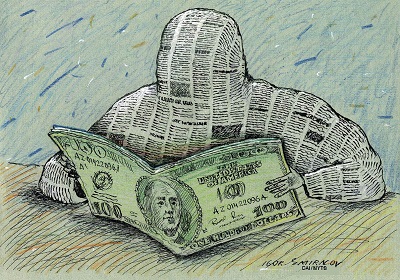
A number of people have asked me to comment on Greg Mankiw’s recent defense of inherited wealth in The New York Times. It’s a strange piece, oddly disconnected from the real concerns about patrimonial capitalism. But let me focus on two key problems with Mr. Mankiw’s analysis – one purely economic, one involving political economy.
So, on the economics: Mr. Mankiw argues that accumulation of dynastic wealth is good for everyone because it increases the capital stock and therefore trickles down to workers in the form of higher wages. Is this a good argument?
Well, if there’s one thing I thought economists were trained to do, it was to be clear about opportunity cost. We should compare accumulation of dynastic wealth with some alternative use of resources – not assume, as Mr. Mankiw in effect does, that if not passed on to heirs that wealth would simply disappear. Maybe he’s assuming that the alternative would be riotous living by currently rich people, but that’s not a policy alternative.
In fact, what we’re really talking about here is the taxation of wealth, and the question is what would happen to that revenue versus what happens if the rich get to keep the money. If the government uses the extra revenue to reduce deficits, then all of it is saved – as opposed to only part of it if it’s passed on to heirs. If the government uses the revenue to pay for social insurance and/or public goods, that’s likely to provide a lot more benefit to workers than the trickle-down from increased capital.
The point is that supporters can only justify Mr. Mankiw’s claim that inherited wealth is necessarily good for workers by insisting that the government would do nothing useful with the revenue from inheritance taxes. I’d call that assuming your conclusions; in any case, it’s a claim that deserves to be made openly, not smuggled in on the pretense that he’s just doing economic analysis.
But the larger criticism of Mankiw’s piece is that it ignores the main reason we’re concerned about the concentration of wealth in family dynasties – the belief that it warps our political economy; that it undermines democracy. You don’t have to be a radical to share this concern – not only did people like Theodore Roosevelt openly talk about this problem, so did (as the economist Thomas Piketty pointed out) Irving Fisher in his presidential address to the American Economic Association in 1919.
What’s curious is that conservative economists are well aware of the danger of “regulatory capture,” in which public institutions are hijacked by vested interests, yet blithely dismiss (or refuse even to mention) the essentially equivalent problem of democratic institutions being hijacked by concentrated wealth. I take regulatory capture quite seriously; but I take plutocratic capture equally seriously. And this is not an issue you can deal with by claiming that the benefits of capital accumulation trickle down to workers.
If Mr. Mankiw wants to argue that the costs of any attempt to limit wealth concentration would exceed the benefits, fine. But “more capital is good” is not a helpful contribution to the discussion.
Join us in defending the truth before it’s too late
The future of independent journalism is uncertain, and the consequences of losing it are too grave to ignore. To ensure Truthout remains safe, strong, and free, we need to raise $44,000 in the next 6 days. Every dollar raised goes directly toward the costs of producing news you can trust.
Please give what you can — because by supporting us with a tax-deductible donation, you’re not just preserving a source of news, you’re helping to safeguard what’s left of our democracy.